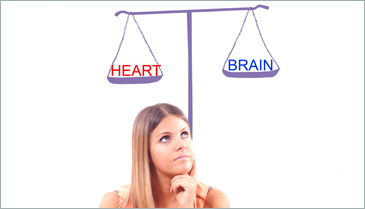 Holistic heart doctor, and Daniel Plan Wellness Contributor, Joel K. Kahn, MD, reveals the strong connection between heart health, the brain and your gut.
Holistic heart doctor, and Daniel Plan Wellness Contributor, Joel K. Kahn, MD, reveals the strong connection between heart health, the brain and your gut.
I am a cardiologist and was trained to learn about the heart and blood vessels. A gastroenterologist knows the GI track and a neurologist knows the brain and nerves. Increasingly, it is appreciated that illness cross these lines and the body works in a web or system with interconnections that are complex.
One example of this is a cardiac condition called atrial fibrillation or AFIB. This is a common irregular heart beat that is a disorganized rhythm of the top of the heart. It may lead a person to feel palpitations, shortness of breath, or fatigue. Because the top of the heart is not contracting the blood vigorously, clots may form and stroke is a risk. So many patients that I see in my office and hospital practice have this condition and require testing, treatment with heart rate slowing medications and blood thinners, and sometimes procedures to shock the heart back to normal rhythm or even placing catheters inside the body to try to maintain regular heart beats.
The connection between AFIB and the brain has been described recently. It is not certain which is the apple and which is the cart but persons with AFIB have increased rates of depression and anxiety. An obvious connection may be the concern over testing, stroke risk, medication actions and so on. Persons with AFIB report dissatisfaction with work, home, relaxation, and sexual activity. The cycle also turns as patients with AFIB who exhibit depression or anxiety show more recurrence of the rhythm. It may be the stress causes an adrenaline release which stimulates the heart to beat irregularly more of the time. Fortunately it has been shown that effective therapy of AFIB through medication and catheter treatments reduces the depression and anxiety.
Where does the gut fit in with the brain and heart link?
A large percentage of the nervous system is found in the GI track and the health of the gut is now known to influence the health of the brain (hence your gut feelings). The types of bacteria growing in the colon of depressed and anxious persons are different than the types of bacteria in persons without these conditions. It may be that improving the health of the GI track, including using probiotics, is another treatment path for depression and anxiety.
What can you do about all of this?
You can avoid atrial fibrillation by shunning excessive alcohol, controlling your blood pressure, maintaining your weight, and seeking treatment for sleep apnea if you snore or stop breathing at night. Your fork and plate play a central role. A diet high in junk and processed foods such as processed meats, sweet desserts, fried foods, white flour and sugar treats, and high fat dairy products promote damage to the bacteria in the colon and subsequently the health of the brain. On the other hand, a diet based in whole foods rich in brightly colored fruits and vegetables has the opposite effect. Foods rich in omega-3 fatty acids such as flax seed, chia seed, walnuts, salmon, spinach and broccoli are a great choice. Foods high in B vitamins like whole grains, vegetables, and nuts are healthy choices. Important minerals like magnesium, zinc and selenium can be found in nuts, seeds, whole grains, green vegetables and fish. If you don’t want to fuel the junk GI-Brain-Heart axis then dump the junk food and eat The Daniel Plan way. Here is wishing you a healthy and productive day. Keep the faith that your fork helps determine your fate.
By: Joel K. Kahn, M.D.
The Holistic Heart Book




